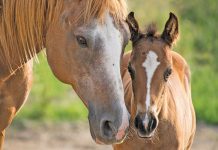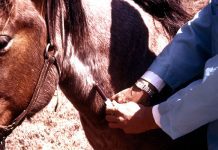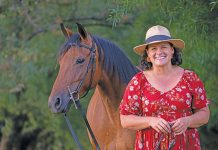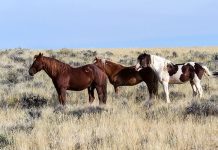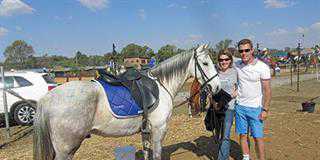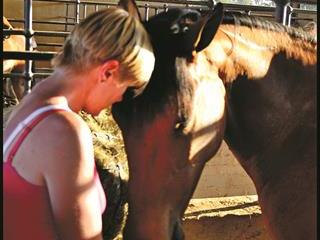
Rabies is a virus from the Rhabdovirus family and is usually found in wild animals such as bats, the yellow mongoose, the bat-eared fox and the black-backed jackal. The disease can be spread from any of these creatures to humans – or unvaccinated domestic animals, pets and horses. I have never heard of any human getting rabies from an infected horse, however. There is no effective treatment once an animal has been infected with rabies.
Infection and symptoms
The virus is transmitted through saliva. The incubation period can be anywhere from two to 10 weeks, depending on the area on the body bitten. There have been cases of incubation periods up to 15 weeks long. Rabies is difficult to diagnose as the general symptoms are similar to other equine neurological diseases, such as West Nile virus, equine herpes and equine protozoal myeloencephalitis.
Horses that have been infected may go off their feed, show signs of depression and salivate excessively. They may also have difficulty swallowing, lack co-ordination, and display aggressive behaviour, extreme excitability, colic, convulsions or paralysis.
If a horse has the clinical signs, death is almost sure to follow within five days. No laboratory tests are currently available to confirm rabies in live animals. A post-mortem is required for a definite diagnosis. Indeed, a
post-mortem must be carried out on any horse believed to have died from the above neurological diseases.
Euthenasia: the only real option
If you suspect that your horse has rabies, handle it with extreme care and keep it away from other animals. Also remember that rabies is a notifiable disease: you are required by law to report it to the local state vet, even if the disease is only suspected.
If your horse is infected with the disease, the most responsible and kindest course of action is to euthanise it. This is the only way to avoid your horse injuring itself even further, or, more seriously, infecting its handlers.
Vaccination and risk factors
Horses three months and older can be vaccinated against rabies. A yearly booster is also required. If you believe that a horse might have been exposed to rabies, do not vaccinate it for at least six months. You can, however, give boosters to such animals.
Depending on where you live, vaccination against rabies might not be a priority. Speak to your vet. Horses at petting zoos and therapeutic riding yards are at a higher risk of exposure in certain circumstances:
- The animals are out in the fields;
- There are wild animals in the area;
- There has been a confirmed report of a rabid animal in the vicinity;
- The region is known for frequent outbreaks of rabies.
Even if your horses are not in a high-risk area, it clearly makes sense to consider rabies vaccination as part of your annual immunisation programme. Most horses, after all, live in close proximity to wildlife, which is often attracted to stables by the feed sources available there. So why take a chance? The cost associated with a rabies vaccination is minimal; the peace of mind it buys is priceless.


